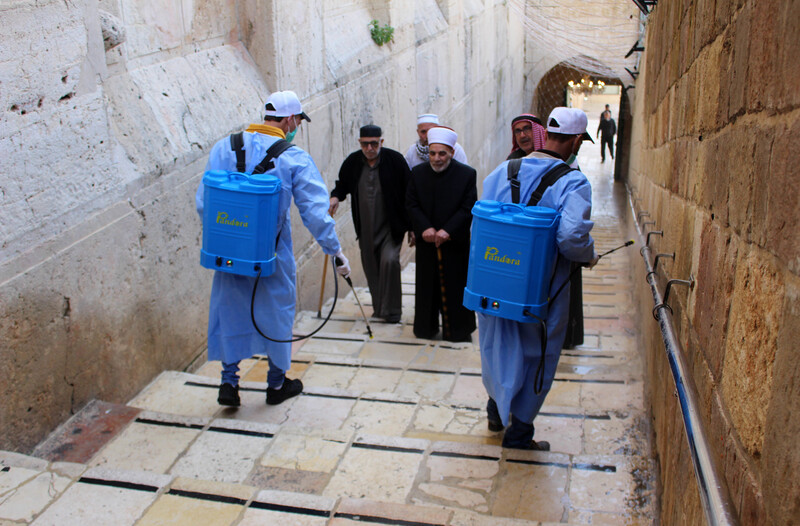Rights and Accountability 11 March 2020

Palestinian workers disinfect an alley near the Ibrahimi mosque in the West Bank city of Hebron on 11 March.
APA imagesThere are now 30 confirmed cases of COVID-19, the disease caused by the new coronavirus, in the occupied West Bank, the World Health Organization reported on Wednesday.
All of those cases are in the Bethlehem area, except for one in Tulkarm.
“COVID-19 cases reported from Bethlehem have developed no symptoms so far and remain currently quarantined in a hotel,” WHO stated.
“A preventive medicine doctor is available on site to ensure adequate case management procedures.”
Palestinian Authority leader Mahmoud Abbas declared a state of emergency and sweeping measures to contain the virus after it was detected in the West Bank last week. No cases of the coronavirus have been reported so far in Gaza.
The risk of the virus spreading in the West Bank and Gaza “remains very high,” WHO stated.
As of Wednesday, there have been more than 118,000 confirmed cases of COVID-19 worldwide, nearly 4,300 of them fatal.
WHO has now characterized the global COVID-19 outbreak as a pandemic, the first sparked by a coronavirus.
The Mediterranean region is an epicenter of the virus, with nearly 8,700 cases and 300 deaths in 16 countries.Israeli closures
Israel’s health ministry has reported almost 100 cases of the coronavirus.
Air traffic to and from Israel has all but shut down after a mandatory 14-day quarantine was announced for anyone entering the country.
On Thursday Israel plans to “impose an extensive closure on movement of people to and from the Gaza Strip in response to Coronavirus concerns,” the human rights group Gisha stated on Wednesday.
The increased restrictions most directly affect some 6,000 Gaza residents holding “trader” permits allowing them to work in the West Bank and Israel.
Restrictions on travel through the Erez checkpoint, the only crossing for people between Gaza and Israel, had already been tightened on Sunday for the Jewish holiday of Purim.Palestinians in Gaza have been subjected to Israeli movement restrictions for decades and those wishing to leave the territory via Erez require Israeli approval. Even during “normal” periods, travel to and from Gaza via Erez is generally limited to those who Israel considers “humanitarian” cases.
Rafah Crossing on the Gaza-Egypt boundary remained open on Wednesday. Authorities in Gaza have established a quarantine center at the crossing to isolate travelers returning from high-risk countries.
“Individuals entering the Strip from other destinations will be instructed to remain in self-quarantine at home,” Gisha stated.
The rights group added that WHO is helping to set up a medical facility near Rafah in case of an outbreak.
“The facility will include an intensive care unit with 36 beds, and 30 additional beds for diagnosed patients with milder symptoms,” Gisha said.
An outbreak of COVID-19 in Gaza would likely cause a disproportionate number of deaths versus an outbreak in other areas of the world.
One of the most densely populated areas on the planet, Gaza’s population of two million is deeply impoverished after 13 years of a severe Israeli blockade.
“Tap water in the Strip is already mostly undrinkable even in ordinary times, and waste disposal services are poor due to insufficient supply of electricity and inadequate infrastructure,” according to Gisha.Nearly half of essential medicines in Gaza are stocked at less than a one-month supply or are completely depleted.
A large number of COVID-19 cases would contribute to the “collapse” of Gaza’s health system, a WHO official has warned.
Travel in and out of the West Bank is severely restricted after Jordan, which has reported one case of the coronavirus so far, closed its side of the crossing on Monday. The following day, Israel announced the closure of the side it controls.
Jordan on Tuesday imposed additional restrictions on international travel, while Kuwait announced that starting Friday it would suspend all flights in and out of the Gulf state for at least two weeks.
Discriminatory response
Palestinian human rights groups have pointed to the discriminatory response to the coronavirus by Israel.
Israel has failed to provide real-time coronavirus updates in Arabic for Palestinian citizens who make up around one-fifth of its population, Adalah, a group that advocates for the rights of that community, stated on Tuesday.
“An examination of the Israeli health ministry’s website revealed that ongoing updates related to coronavirus are being issued only in Hebrew; Arabic-language updates are issued only after significant delays,” Adalah said.
“In addition, the ministry’s social media posts and smartphone app are accessible only in Hebrew.”
Adalah added that the failure to provide up-to-date information in Arabic “not only violates the right to equality but also constitutes an immediate danger to public health.”
Al Mezan, a human rights group based in Gaza, stated on Tuesday that prison authorities had not taken adequate measures to protect the health of some 5,000 Palestinians held in Israel’s prisons and detention centers.
This includes the failure to provide information in Arabic and holding Palestinians in overcrowded conditions with eight Palestinians per cell, versus four Israelis per cell on average.
Israeli prisoners are allowed to receive family visits with a glass partition while Palestinians are not allowed such visits.
The Israel Prison Service said on Wednesday that it was considering imposing quarantines on prisons if an outbreak occurs. It was planning on evacuating a prison so it could serve as a quarantine center if any prisoners contract the virus.
Hours later, Israeli media reported that a prison officer at the Nitzan detention center had tested positive for the coronavirus after coming into contact with a sick person in detention.
While the detained person has not been identified, Nitzan, also known as Ramle prison, is used to detain Palestinians as well as Israelis.
In July 2019, Palestinian detainee Nasser Taqatqa died in the prison.
Human rights groups said his death may have been the result of torture and medical neglect.





